The ultimate guide to understanding your Nissan’s dashboard symbols, indicators, warning lights, and their meanings
You made a great choice when you bought your Nissan. These cars are known for their reliability, fuel efficiency, and sleek designs. Like any piece of machinery, however, your Nissan requires maintenance. The vehicle's dashboard indicator and warning lights are your Nissan’s way of communicating with you. They are designed both for your safety and to help you keep your Nissan in tip-top condition so you can drive it for years.
While the dashboard lights are handy, they can be a bit difficult to decipher. That's where this post comes in. We will explain the most common Nissan dashboard symbols, indicators, warning lights, and their meanings. You'll want to bookmark, pin, or save this post for future reference.
Indicator Lights vs. Warning Lights
All of the lights on your dashboard are important, but not all of them mean you have to take immediate action.
Indicator lights are informational. They tell you something you need to know about your vehicle, but they are not warning you of a potentially serious, even dangerous, situation. They're more like a heads-up.
Indicator lights include your turn signals and headlight indicators. They are generally blue or green and tell you a system is in use. They also remind you to turn off the system if you don't need it. You don't want to be that person driving down the street with your turn signal flashing.
On the other hand, warning lights mean you need to take action sooner rather than later. They are yellow and red.
Yellow warning lights are for minor issues or things you can handle yourself, like getting gas or topping off your tires. You can continue to drive when a yellow light comes on, but you will need to take action soon. You don't want to run out of gas or get a flat!
Red lights, on the other hand, are serious. When one comes on, you need to pull over as soon as you safely can. Red lights warn you of a potentially major malfunction that requires a trained Nissan expert like the ones at Coulter Nissan's top-notch Service Center to help you head off an issue before it escalates into a dangerous situation for you or what could be a costly repair.
Your Nissan's dashboard lights will all illuminate when you start the vehicle. They should turn off after a couple of seconds. If they don't, or if one lights up while you're driving, your Nissan is telling you something. Pay attention.
Time to break it down light by light.
Battery Charge Warning Light

What it means: This warning light signals an issue with the vehicle's charging system. It may indicate a problem with the battery, alternator, or electrical system.
What to do: If the light comes on while driving, it's crucial to have the charging system checked as soon as possible. A faulty alternator or battery can leave you stranded, so it's best to address it immediately.
You can drive when the Battery Charge Warning Light is on, but it's not a good idea.
Note: Arizona summers are brutal on vehicle batteries; batteries go bad quickly here, so keep track of when your battery was installed. You might need a new one. Visit the Coulter Nissan Service Center for Battery Service.
Brake Warning Light
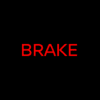
What it means: This could indicate a few things. First, it could mean that the parking brake is still engaged. Alternatively, it could signal low brake fluid, worn brake pads, or an issue with the braking system.
What to do: If the parking brake is off and the light remains on, check the brake fluid level. If it's low, top it up. If the fluid is fine or the brake light is flashing, get the vehicle inspected by a professional at Coulter Nissan's Service Center immediately.
If this light comes on while you're driving, don't panic. Pull over as soon as you safely can. Keep in mind that it might take a little longer than usual for your car to come to a stop.
Engine Oil Pressure Warning Light

What it means: This warning indicates that your engine's oil pressure is too low. It could mean you're running low on oil or there's a problem with the oil pump, filters, or pressure sensor.
What to do: Pull over safely and turn off the engine. Check the oil level and top it up if necessary. If the light stays on or you can't identify the issue, have the vehicle towed to Coulter Nissan's Service Center for further inspection.
Airbag Warning Light

What it means: It should come on when you start your Nissan, then turn off after 7 seconds. That means the system is engaged and working as expected.
If it doesn't come on when you start the engine, or it comes on or intermittently flashes, there would be a problem with the system.
What to do: Have a trained Nissan expert like the ones at Coulter Nissan's Service Center take a look.
Electric Shift Control System Warning Light

What it means: The Electronic Shift Control System runs the shift system, including engaging the parking brake. When this warning light comes on, there could be a problem with the system. Shifting might be erratic, and you might not be able to shift into park. The issue could be with the transmission, electrical connections, or the parking brake.
What to do: If the light stays on after you start your Nissan, you’ll want to take it into Coulter Nissan’s Service Center as soon as you can.
Electronic Parking Brake Warning Light

What it means: This light comes on when the electronic parking brake warning light is operating. When you start the engine and disengage the brake, the light will turn off. You want to be sure the light is off before driving.
If the electronic parking brake warning light illuminates or flashes while the Electronic Parking Brake System Warning Light (yellow) illuminates, it may indicate that the electronic parking brake system is not functioning properly.
What to do: It’s time for a trip to the dealership so a trained Nissan expert can take a look. Visit our Brakes Service Center page for more information.
Hands Off Warning Light

What it means: You've taken your hands off the steering wheel while Steering Assist is active. The light comes on after about 10 seconds. If you don't put your hands back on the wheel, the light will flash, and an alert tone will sound. If you still don't respond, your Nissan will automatically turn on the hazard lights, engage the brake, and bring itself to an emergency stop.
While your Nissan is equipped with Steering Assist to help you on the road, it's not a hands-free driving system.
What to do: Keep your hands on the wheel and pay attention to what you're doing.
Master Warning Light

What it means: This one is a catchall. It means something requires immediate attention. The light will be yellow or red, depending on the severity of the issue. Remember what we said about red – it requires immediate action.
What to do: Check the vehicle information display and contact Coulter Nissan's Service Center if necessary.
Seat Belt Warning Light

What it means: This one is all about safety. The light and accompanying chime or tone are reminders for everyone in the car to buckle up. Safety experts have said for years that the best thing you can do to protect yourself in case of a wreck is to wear your seat belt.
What to do: Make sure everyone is wearing their seat belt.
Front Passenger Airbag Status Light
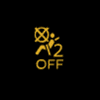
What it means: The front passenger airbag is off and will not deploy in a wreck.
Anti-lock Braking System (ABS) Warning Light

What it means: The ABS light comes on when there's an issue with the Anti-lock Braking System. ABS is responsible for preventing the wheels from locking up during braking, especially in slippery conditions.
What to do: If this light turns on, your Nissan still has regular brakes, but you may lose the added safety of ABS. It's a good idea to have the system checked to ensure it's functioning correctly, but you can still drive to Coulter Nissan's Service Center.
Automatic Emergency Braking (AEB) System Off Warning Light

What it means: Your AEB system is set to OFF in your vehicle information display. It could also mean the system is unavailable.
What to do: If the light remains illuminated with the system on, stop the vehicle in a safe place, place the shift lever in the P (Park) position, and turn the engine off. Check that the sensor areas are clean, then restart the engine.
If the light remains on and a warning message appears, have the system checked at Coulter Nissan's Service Center.
Electronic Power Steering Warning Light

What it means: This light indicates a problem with the power steering system, which could make steering your car noticeably difficult. (If you've ever driven without power steering, you know. The difference in handling is not subtle.)
What to do: If the steering feels heavy, stop and check the power steering fluid level. If the light stays on, the power steering system may need repair.
Electronic Parking Brake System Warning Light

What it means: This might indicate the electronic parking brake system is not working as it should. If the Electronic Parking Brake Warning Light comes on or flashes while this light is on, it may indicate that the electronic parking brake system is not functioning properly.
What to do: Have your car checked out by a Nissan expert as soon as you can.
Tire Pressure Monitoring System (TPMS)
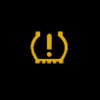
What it means: This light comes on when one or more of your tires is significantly underinflated. Low tire pressure can affect the wear on your tires. It also can impact your vehicle's handling and fuel efficiency, so it's essential to address this promptly.
What to do: Check all four tires for correct pressure and inflate them as necessary. If the light doesn't turn off after inflating the tires, it could indicate a problem with the TPMS sensor, and you should get the system checked.
Note: Extreme temperatures can affect tire pressure.
Check Engine Light or Malfunction Indicator Light (MIL)

What it means: Also called a Malfunction Indicator Light (MIL), this is one of the most common warning lights in all cars, and for a good reason. The check engine light can indicate various issues ranging from something simple like a loose gas cap to something more serious like a malfunctioning engine sensor.
What to do: If the light is solid and doesn't blink, it generally means there's a non-urgent issue like a loose fuel cap. However, if the light is flashing, this indicates a more serious problem, like misfiring. You should stop driving as soon as possible and have the vehicle checked, schedule your appointment today at Coulter Nissan's Service Center.
Rear Automatic Braking (RAB) System Off Warning Light

What it means: Your RAB is set to off in the vehicle information display or the system is unavailable.
What to do: If this light is illuminated when the system is engaged, you should have a trained professional at Coulter Nissan's Service Center take a look.
Stability Control Warning/Slip Indicator Light
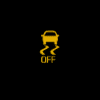
What it means: This Symbol illuminates when there's an issue with the stability control system, which helps prevent skidding. It can also come on when the system is actively trying to prevent wheel spin in slippery conditions.
What to do: If the light stays on, it's a good idea to have the system checked. It's safe to drive, but the vehicle may not be as stable in adverse conditions until fixed.
Automatic Brake Hold Indicator Light

What it means: If the light is white, the automatic brake hold system is on standby. If it’s green, the system is operating, holding your Nissan stationary even if your foot isn’t on the brake pedal. It kicks on when you come to a complete stop and stays active until you press the accelerator.
Exterior Light Indicator

What it means: This indicator comes on when the side light or headlight position is selected.
Front Fog Light Indicator

What it means: Your Nissan’s fog lights are on.
High Beam Assist Indicator Light
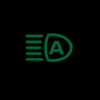
What it means: This one illuminates when the headlights come on while the headlight switch is in the AUTO position with the high beams selected.
Turn Signal/Hazard Indicator Lights

What it means: The right or left arrow flashes when you are one of the few people to use your turn signal. The arrows flash together when you turn on your Nissan’s hazard lights, also called emergency flashers, to warn other drivers that you are stopped or moving very slowly are are a potential hazard.
Note: If you’re caught in a dust storm, turn off your hazards once you’re safely off the road. While flashers are meant to warn drivers of potential danger, the low visibility during a monsoon dust storm changes the situation drastically. Other drivers might not realize you’re stopped and try to follow you. They could drive right into the back of your Nissan. Also, the glare of the lights could make visibility worse for other drivers. If you have to pull over during a storm, you’ll want to pull as far off the road as you can, stop and set the parking brake, and then turn off all of your Nissan’s lights. Make sure to take your foot off the brake while you wait for the storm to pass. It’s usually not too long.
High Beam Indicator Light

What it means: Your Nissan’s high beams are on. This light turns off when you switch back to your regular lights.
Your Nissan will take care of you if you take care of it.
Your Nissan's dashboard lights are your first line of defense against potential car problems. While many of them are minor, some could indicate serious issues that require immediate attention. Pay attention to the color and behavior of the lights.
Remember, yellow means you need to do something, but not right away. Red lights mean immediate attention is necessary.
Always consult your owner's manual for a comprehensive list of dashboard lights specific to your Nissan model. Click here to download your manual if you don't have yours handy. When in doubt, don't hesitate to visit Coulter Nissan's Service Center for help from a trained technician. These people are Nissan experts and will take excellent care of you and your vehicle.